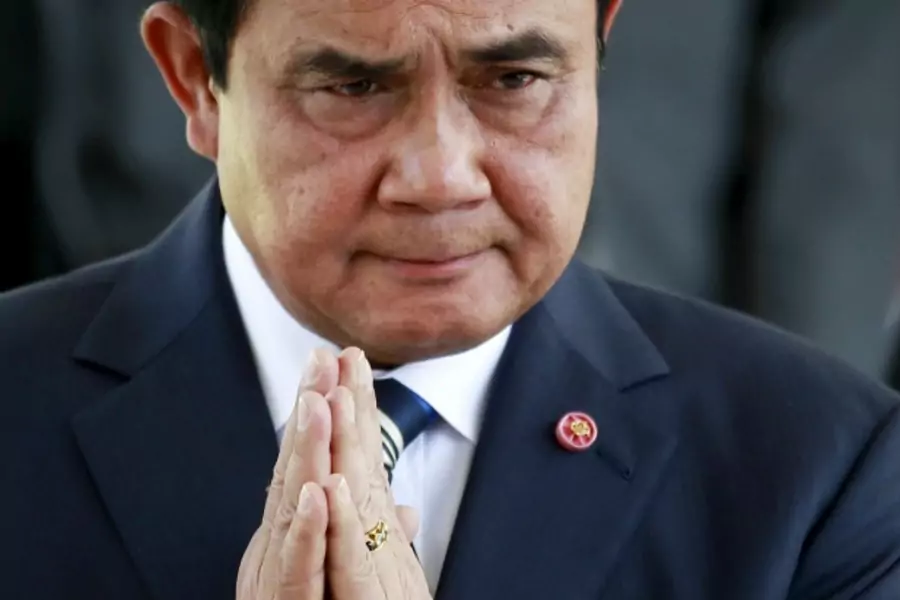More on:
As Thailand’s political situation continues to deteriorate, with civilian politicians beginning to push back against army rule, and the deadline for a new constitution and free election delayed again, Thai Prime Minister and junta leader Prayuth Chan-ocha seems increasingly frustrated with the debate, compromise, and public scrutiny common in a constitution-drafting process, and a democratic society. The prime minister has become known for his outbursts at the press and other critics, but in recent weeks his speeches have become more vitriolic.
Last Wednesday, in the middle of a long speech, Prayuth publicly warned: “I must make it clear. If there is no peace and order [in Thailand], I must stay on” as prime minister. Prayuth has not defined exactly what constitutes a lack of peace and order in the kingdom. It is not the first time the junta leader, already the longest-serving Thai coup leader in decades, has threatened that he could hold the prime minister’s job for an extended period of time; the junta had originally promised that Prayuth would just be a caretaker, until 2015 or 2016 at the latest. Yet Prayuth’s warnings about his hold on power, such as this one, have become increasingly ominous.
By now, more than a year into junta rule, the military has taken over or co-opted most institutions in Thai society. Many press outlets are cowed, with some of the most critical reporters having quit or engaged in self-censorship. Thailand’s once independent bureaucracy has mostly toed the junta’s line. And it appears that even the royal palace is not immune from the junta’s power. A series of recent lèse majesté arrests, believed to be of figures close to Thailand’s Crown Prince, suggest the military may also be sending signals that it will weaken the power of the Prince and his associates.
Still, Thailand’s civilian politicians have not all accepted long-term junta rule as a fact. Pressure from both Democrat Party and Puea Thai leaders helped force the first constitution-drafting committee to rule out some of the most antidemocratic clauses in their proposed charter, and ultimately to vote down the charter itself. Former Puea Thai politicians and Puea Thai supporters have vowed to begin holding public rallies, wearing red, the symbolic color of Puea Thai and of former Prime Minister Thaksin Shinawatra. Ultimately, a growing group of former Puea Thai politicians and supporters who want to make their voices heard may clash with the increasingly repressive junta rule.
The effects of Thailand’s political instability are widely felt. Last month, Thailand’s exports fell for the ninth month in a row, as slowing growth in major Thai partners like China and the political chaos in Thailand combined to undermine export growth. The country continues dropping on surveys of press and Internet freedom, even though the junta has vague plans to position Thailand as some kind of regional IT hub. In the most recent Freedom House report Freedom on the Net, released last month, Thailand was ranked as “Not Free," falling behind countries like Zimbabwe and Venezuela in the ranking of Internet freedom. (The junta has proposed further constraining Internet freedoms by creating a single gateway for all content coming into Thailand, though whether it will follow through on that plan remains uncertain.)
More on:
 Online Store
Online Store
